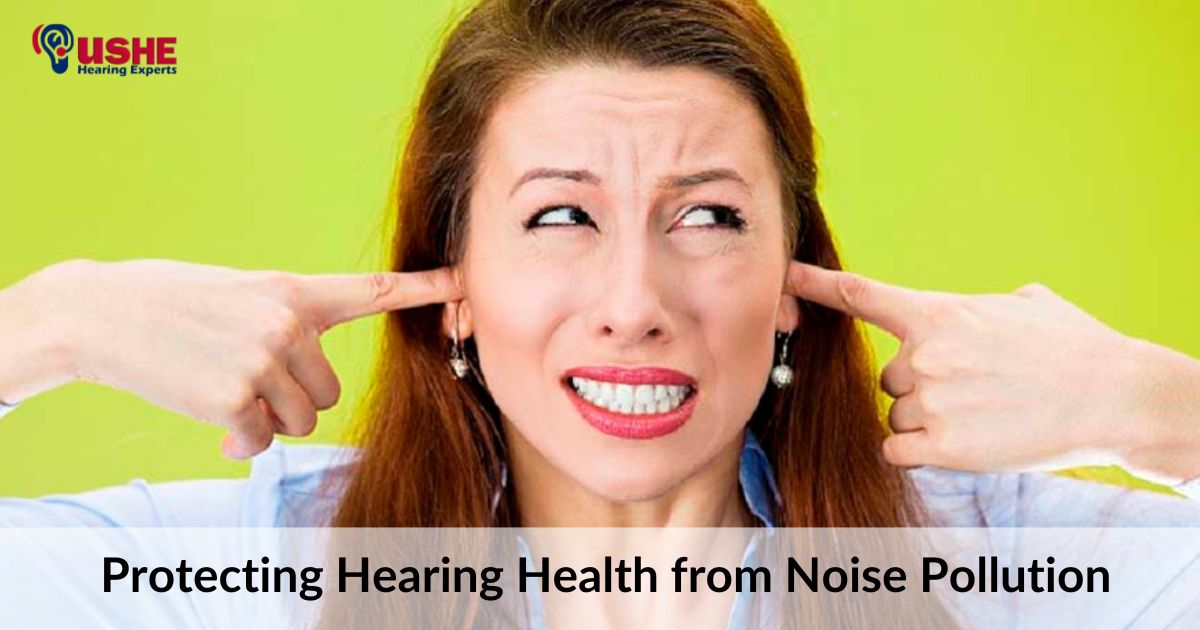Hearing Aid
Protecting Hearing Health from Noise Pollution
In today’s fast-paced, urbanized world, noise pollution has become an inevitable part of daily life. From traffic sounds and construction activities to loud music and household appliances, prolonged exposure to excessive noise can significantly impact your hearing health. According to the World Health Organization (WHO), noise-induced hearing loss is one of the most preventable causes of hearing impairment.
This blog explores the effects of noise pollution on hearing, how to recognize the early signs of damage, and practical steps to protect your hearing health in a noisy world.
Understanding Noise Pollution and Its Impact
What Is Noise Pollution?
Noise pollution refers to harmful or excessive levels of sound that disrupt the natural balance of hearing. Common sources include
Traffic (cars, trains, airplanes)
Industrial or construction noise
Loud entertainment (concerts, nightclubs, or sporting events)
Household appliances (blenders, vacuum cleaners, lawnmowers)
How Noise Affects Hearing
Your ears are delicate organs with tiny hair cells in the cochlea responsible for converting sound vibrations into electrical signals for the brain to interpret. Prolonged exposure to loud noise can damage or destroy these hair cells, leading to noise-induced hearing loss (NIHL). Unlike other cells in the body, these hair cells do not regenerate, making the damage permanent.
Signs of Noise-Induced Hearing Loss
Noise-induced hearing loss can develop gradually, making it difficult to notice in the early stages. Be aware of the following signs
Difficulty understanding speech in noisy environments
A sensation of “ringing” in the ears (tinnitus)
Needing to increase the volume of devices like TVs or headphones
A feeling of muffled or distorted hearing after exposure to loud noise
Recognizing these signs early and taking preventive measures can help protect your hearing health.
How to Protect Your Hearing from Noise Pollution
1. Use Ear Protection
Invest in earplugs or earmuffs to protect your ears in noisy environments.
Earplugs: Compact and affordable, earplugs reduce sound levels effectively. Choose high-fidelity earplugs for environments like concerts.
Earmuffs: Ideal for industrial or construction settings, earmuffs offer maximum protection against loud noise.
2. Lower the Volume
Reduce the volume of personal audio devices like smartphones, tablets, and TVs. Follow the 60/60 rule: listen at no more than 60% volume for no longer than 60 minutes at a time.
3. Limit Exposure to Loud Noise
Avoid extended stays in noisy areas. If unavoidable, take frequent breaks in quieter settings to give your ears a chance to recover.
4. Soundproof Your Home
Minimize indoor noise pollution by using soundproofing materials such as curtains, carpets, and acoustic panels. Turning off noisy appliances when not in use also helps create a quieter living environment.
5. Monitor Noise Levels
Use smartphone apps to measure decibel levels in your surroundings. Safe noise levels are generally under 85 decibels (dB). Anything above this can cause hearing damage with prolonged exposure.
6. Raise Awareness
Encourage friends, family, and colleagues to adopt hearing-friendly practices. Raising awareness about noise pollution helps foster a collective effort to reduce harmful noise.
7. Schedule Hearing Checkups
Regular hearing checkups with an audiologist can help detect early signs of hearing damage and ensure proper interventions when necessary.
Role of Hearing Aids in Addressing Noise-Induced Hearing Loss
If hearing loss occurs, modern hearing aids offer an effective solution. Devices from top brands like Signia, Phonak, and Resound come equipped with noise-cancelling features and adaptive technologies to enhance hearing in noisy environments.
Government and Community Efforts to Reduce Noise Pollution
In addition to personal efforts, governments and communities play a crucial role in tackling noise pollution. Implementing noise control regulations, creating quieter public spaces, and encouraging manufacturers to produce quieter appliances are steps that benefit public hearing health.
Conclusion
Protecting your hearing health from noise pollution requires a combination of awareness, preventive measures, and regular hearing care. By reducing exposure to loud noise and adopting protective habits, you can safeguard your ears for years to come.
At USA Hearing Experts, we’re committed to helping you maintain optimal hearing health. Explore our range of hearing aids and resources for managing hearing loss caused by noise pollution. Take the first step toward a quieter and healthier hearing future today!



